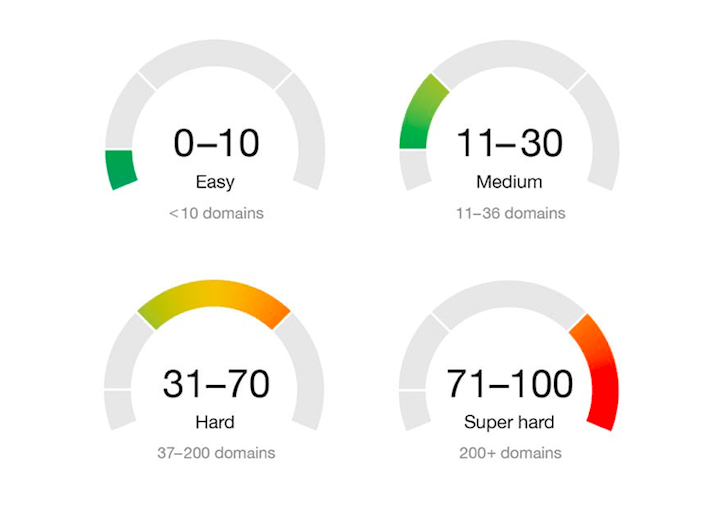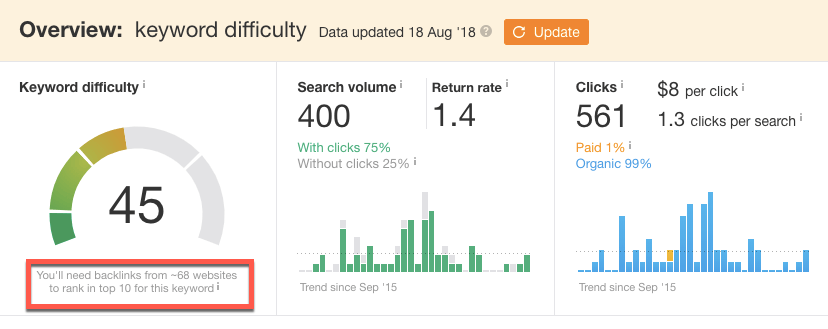Unlock the mystery of keyword difficulty and learn how to conquer it to boost your website’s search engine ranking.

Image courtesy of via DALL-E 3
Table of Contents
Introduction to Keyword Difficulty
In today’s digital age, where information is just a click away, understanding how search engines work can make a world of difference for anyone looking to get noticed online. One of the key concepts in this realm is keyword difficulty. So, let’s dive into what this term means and why it is crucial for anyone trying to stand out in the vast digital landscape.
What is a Keyword?
Before we unravel the mystery of keyword difficulty, let’s first grasp the basic building block – a keyword. Think of a keyword as a secret code that unlocks the treasure trove of information on the internet. When you type a word or phrase into a search engine like Google, you’re essentially using a keyword to find what you’re looking for.
Importance of Keywords in SEO
Now that we understand what a keyword is, let’s talk about why they matter in the world of SEO (Search Engine Optimization). When websites use the right keywords strategically, they have a better chance of showing up higher in search results. This means more people are likely to click on their website, bringing in more visitors and potential customers.
Easy vs. Hard Keywords
When we talk about “difficulty” in the world of keywords and SEO, we’re referring to how easy or hard it is to rank for a specific word or phrase on search engines like Google. Think of it like this: some keywords are like a walk in the park, while others are like climbing a mountain!
Factors Affecting Keyword Difficulty
Several factors come into play when determining the difficulty of a keyword. One major factor is the level of competition. If many websites are already using a specific keyword, it might be harder for your site to stand out in search results. Another factor is the search volume – how often people search for that specific keyword. Popular keywords tend to be more competitive.
Why Keyword Difficulty Matters
Understanding why keyword difficulty matters can significantly impact your website’s performance in search engine results. By selecting the right keywords to target, you increase your chances of ranking higher and attracting more visitors to your site.
Choosing the Right Keywords
When you know the difficulty level of different keywords, you can make informed decisions about which ones to focus on. By strategically selecting keywords that align with your website’s content and goals, you can optimize your chances of ranking well in search results.
Improving Your Ranking
By analyzing keyword difficulty, you can identify opportunities to improve your website’s ranking. Understanding which keywords are more attainable and which ones are highly competitive allows you to tailor your SEO strategy to target keywords where you have a better chance of success.
Tools to Measure Keyword Difficulty
When it comes to optimizing your website for search engines, understanding keyword difficulty is crucial. But how do you know if a keyword is easy or hard to rank for? This is where tools to measure keyword difficulty come into play. These tools provide valuable insights into the competitiveness of keywords, helping you make informed decisions about your SEO strategy.

Image courtesy of www.wordstream.com via Google Images
Popular Keyword Tools
There are several popular tools available that can help you measure keyword difficulty. Some of these tools include SEMrush, Ahrefs, Moz Keyword Explorer, and Google Keyword Planner. These tools provide data on search volume, competition, and difficulty for specific keywords, allowing you to identify the best keywords to target for your website.
How to Use These Tools
Using these tools is relatively straightforward. Let’s take SEMrush as an example. Simply enter a keyword into the tool, and it will generate a keyword difficulty score, usually on a scale from 1 to 100. The higher the score, the more difficult it is to rank for that keyword. Additionally, SEMrush provides other useful metrics such as search volume, organic search results, and cost-per-click (CPC) data, giving you a comprehensive understanding of the keyword landscape.
Tips for Handling Hard Keywords
When you come across hard keywords that seem tough to rank for, don’t fret! There are strategies you can use to tackle them effectively. Here are some tips to help you handle those challenging keywords:
Content Quality
One of the most crucial aspects of handling hard keywords is creating top-notch content. Search engines value high-quality, relevant, and engaging content. By crafting well-written articles, blog posts, or web pages that address the keyword’s topic thoroughly, you increase your chances of ranking higher, even for difficult keywords.
Backlinks
Another key strategy for handling hard keywords is building a strong backlink profile. Backlinks are links from other websites back to your site, and they are like “votes of confidence” for search engines. Having reputable websites linking to your content signals to search engines that your site is trustworthy and authoritative, which can help improve your rankings for difficult keywords.
Real-life Examples of Keyword Difficulty
Let’s say you have a website about cute puppies. One of the keywords you want to rank for is “puppies for adoption.” This keyword has low competition because not many websites are trying to rank for it. You can easily create content around this keyword and optimize your website to appear at the top of search engine results. Using high-quality images and informative articles about adopting puppies can help you secure a top spot for this keyword.

Image courtesy of www.dashclicks.com via Google Images
Case Study: Hard Keyword
Now, imagine you have a website about technology and you want to rank for the keyword “best smartphones.” This keyword is highly competitive because many tech websites are trying to rank for it. To compete in this space, you’ll need to create exceptional content that offers unique insights or reviews on the latest smartphones. Additionally, building strong backlinks from reputable tech websites can also improve your chances of ranking for this hard keyword.
Winning the Keyword Game
In the world of SEO, mastering the art of choosing and optimizing keywords is crucial for achieving success. Let’s explore some tips and strategies for consistently coming out on top in the keyword game.
Staying Updated
One key to winning the keyword game is staying on top of the latest trends and changes in search engine algorithms. Search trends evolve, and new keywords rise in popularity while others fade away. By keeping your finger on the pulse of keyword trends, you can adjust your strategy to stay ahead of the competition.
Continuous Improvement
Another essential strategy for success is continuously reviewing and refining your keyword strategy. Don’t rest on your laurels once you’ve found success with a set of keywords. Regularly analyze your keyword performance, assess the competition, and make adjustments to optimize your content for the best possible results. By committing to ongoing improvement, you can maintain and enhance your SEO success over time.
FAQs on Keyword Difficulty
A keyword is considered difficult based on several factors. Competition plays a significant role – the more websites trying to rank for a specific keyword, the harder it becomes. The popularity of the keyword also matters; more popular keywords are usually harder to rank for. Additionally, the length and specificity of the keyword can impact difficulty, as longer and more niche keywords tend to be less competitive but may have lower search volume.

Image courtesy of www.wordstream.com via Google Images
Can I rank for hard keywords?
While ranking for hard keywords is challenging, it is not impossible. To improve your chances, focus on creating high-quality, relevant content that provides value to your audience. Building strong backlinks from reputable websites can also help boost your ranking for hard keywords. Remember, patience and persistence are key when trying to rank for difficult keywords.
Want to turn these SEO insights into real results? Seorocket is an all-in-one AI SEO solution that uses the power of AI to analyze your competition and craft high-ranking content.
Seorocket offers a suite of powerful tools, including a Keyword Researcher to find the most profitable keywords, an AI Writer to generate unique and Google-friendly content, and an Automatic Publisher to schedule and publish your content directly to your website. Plus, you’ll get real-time performance tracking so you can see exactly what’s working and make adjustments as needed.
Stop just reading about SEO – take action with Seorocket and skyrocket your search rankings today. Sign up for a free trial and see the difference Seorocket can make for your website!
Conclusion
In conclusion, understanding keyword difficulty is crucial for anyone looking to improve their website’s visibility in search engine results. By selecting the right keywords and optimizing your content accordingly, you can greatly increase your chances of ranking higher and attracting more organic traffic to your site.
Key Takeaways
From this article, you’ve learned that keywords play a vital role in SEO, helping search engines understand what your content is about and where it should appear in search results. You’ve also discovered that some keywords are easier to rank for than others, depending on various factors like competition and search volume.
Final Thoughts
As you continue to explore the world of SEO and digital marketing, remember to keep a close eye on keyword difficulty and use tools to measure and analyze it effectively. By staying informed and adapting your strategy to the changing landscape of the internet, you’ll be well-equipped to improve your website’s ranking and reach a wider audience.







